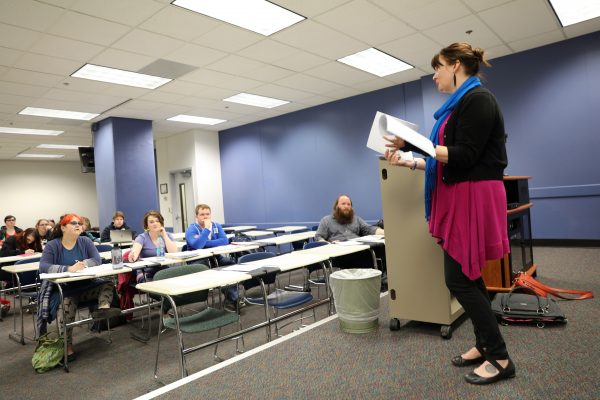New language developed in UAF linguistics course
July 11, 2017
Marissa Carl-Acosta
907-455-2070

Download text and photos here.
"Nix fadstälnaw r”idi chyai" means “Let’s explore somewhere new” in Fosk, a language constructed by students in a linguistics course at the University of Alaska Fairbanks.
During the spring 2017 semester, 25 students built Fosk from scratch while enrolled in Robin Shoaps' innovative course, Klingon, Elvish and Dothraki: The Art and Science of Language Creation. The students chose what their language would sound like and how it would be written. They developed a vocabulary of more than 1,000 words.
“Languages are complex, and new things came up all the time that we needed to address,” said Colleen Mertes, a senior majoring in anthropology and minoring in journalism. “Certainly, Fosk isn't 100 complete, but it’s well done.”
Students went beyond the language and invented an entire world in which it would be used. Shoaps, an assistant professor of anthropology and linguistics, explained the reasoning on the class website: “Language is about more than just words and how people communicate. It also is an integral part of a culture, place and history.”
Mertes’ favorite assignment was translating myths from English into Fosk. The myths first had to be written “based on our imaginations, other myths we knew of and the religious beliefs of the world we created for Fosk.”
Shoaps, who has taught Introduction to Linguistics in the past with mild success, wanted to develop a course that was more appealing to non-linguistics majors and could attract new students.
While thinking about people who might be interested in linguistics without even knowing it, she found the conlang (short for “constructed language”) community. Around the world, including in Fairbanks, hobbyists known as conlangers are creating new languages. One of the best-known examples is Klingon, the alien language spoken by some characters in "Star Trek."

“Outside of a linguistics class I have never seen people asking questions about definite and indefinite articles,” said Shoaps, who spent hours exploring conlang Reddit threads.
She realized how closely the hobby resembled her discipline. “This might be a way, a hook, to really get students thinking about language and expose them to linguistics,” she thought.
Her hunch was right. A handful of students last semester were conlang hobbyists, and a few, Shoaps anticipates, will continue studying linguistics. Regardless, she is pleased with the overall engagement: “I had students bring boyfriends and roommates to class for fun.”
Shoaps is the only one in her field using these conlang techniques in a college class. “It’s a really good vehicle for addressing some of the more technical parts of linguistics to a non-linguist audience,” she said.
Mertes and another non-linguistics major from the class presented “The Creation of Fosk” at UAF’s Linguistics Student Association Conference in April.
Much of the course’s success was due to extensive preparation and choosing the right technological tools. Shoaps, who developed the course within the Chancellor’s Innovation in Technology and Elearning fellows program, worked with UAF eLearning instructional designers for more than a year before offering the class.
“I wouldn’t be able to teach it without CITE fellows,” said Shoaps, who received both technological and teaching support. “It wouldn’t be possible for me to have a class with 25 students and have each student create a language, but how do you get 25 people working on the same language?”
Sean Holland and Jennifer Moss, UAF eLearning instructional designers, were able to provide solutions that turned Shoaps’ ideas into reality.
“We did a lot of testing of technologies to find the best ones to help facilitate Robin’s work with students on multiple fronts — everything from vocabulary development to relational database design to font creation and presentation,” Moss said. “It was great to collaborate with a faculty member who is so passionate about her discipline, her course and trying new technology.”
Shoaps intends to offer the course, Linguistics F294, again. She is working with instructional designers to potentially offer an online section.
Students in the class have posted examples of the Fosk language and Fosk myths online.


